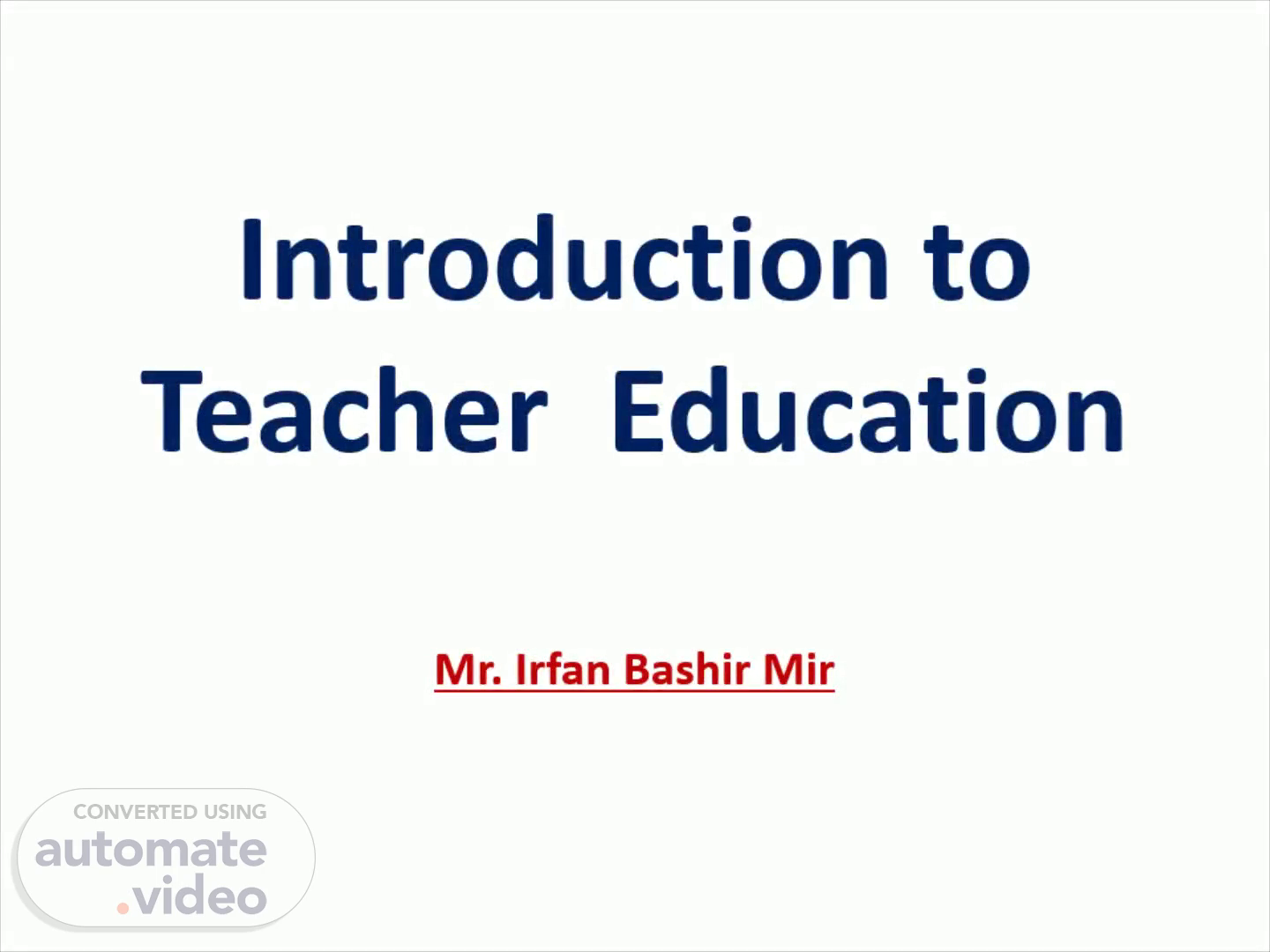
Introduction to Teacher Education Mr. Irfan Bashir Mir
Scene 1 (0s)
Introduction to Teacher Education Mr. Irfan Bashir Mir.
Scene 2 (7s)
LESSON NO 01:- Teacher Education: The Concept. Rabindra Nath Tagore rightly said, “A teacher can never truly teach unless he is still learning himself. A lamp can never light another lamp unless it continues to burn its own flame.” The Education Commission (1964-66) professed, “The destiny of India is now being shaped in her classrooms”. The National Policy on Education 1986 emphasize: “The status of the teacher reflects the socio-cultural ethos of the society; it is said that no people can rise above the level of its teachers”..
Scene 3 (32s)
OER. https :// www.youtube.com/watch?v=HThaqzkO6lE https:// www.youtube.com/watch?v=QFp6_BGnSc8 https://archive.mu.ac.in/myweb_test/ma%20edu/Teacher%20Education%20-% 20IV.pdf https://ddceutkal.ac.in/Syllabus/MA_Education/Paper-4.pdf.
Scene 4 (50s)
https:// edpuzzle.com/media/5e3bdcbfc8b81140d7b9cb28 https://blog.ed.ted.com/2016/10/04/lead-a-ted-ed-professional-development-workshop-designed-for-teachers-by-teachers/.
Scene 5 (1m 4s)
A programme of education, research and training of persons for equipping them to teach at pre-primary, primary, secondary and senior secondary stages in schools and includes non-formal education, part-time education, adult education and corresponding education.” (NCTE Act, 1993) Good’s dictionary of Education defines Teacher Education as “All formal and informal activities and experiences that help to qualify to a person to assume the responsibility as a member of the educational profession or to discharge his responsibility most effectively”.
Scene 6 (1m 27s)
Teaching skills would include providing training and practice in the different techniques, approaches and strategies that would help the teachers to plan and impart instruction, provide appropriate reinforcement and conduct effective assessment. It includes effective classroom management skills, preparation and use of instructional materials and communication skills. Pedagogical theory includes the philosophical, sociological and psychological considerations that would enable the teachers to have a sound basis for practicing the teaching skills in the classroom. The theory is stage specific and is based on the needs and requirements that are characteristic of that stage. Professional skills include the techniques, strategies and approaches that would help teachers to grow in the profession and also work towards the growth of the profession. It includes soft skills, counseling skills, interpersonal skills, computer skills, information retrieving and management skills and above all lifelong learning skills..
Scene 7 (2m 3s)
Need and Significance of Teacher Education. The society is expecting quality education so that youngsters achieve top placements nationally/internationally. It is the teachers who are called as the nation builders. The competency of the teacher reflects the socio-cultural, religio -political, and physio -spiritual ethos of a society; it is said that no people can rise above the level of its teachers. The over-all objective of teacher education is to equip the prospective teacher with necessary skills, knowledge and technique/strategies for the education of the child..
Scene 8 (2m 28s)
The major needs of the teacher education programme are as follows:.
Scene 9 (2m 59s)
Developing among student teachers an integrated and holistic approach in the teaching of social sciences and technology; Developing among student teachers the competencies in the use of locally available educational resources; Empowering student teachers to know how learners construct knowledge and to facilitate the process; Developing among student teachers the skills of communication and language proficiency; Helping student teachers to acquire repertoire of strategies, competencies and skills for transaction and evaluation; Appreciating the impact of various changes taking place in the society i.e. liberalization, privatization and globalization (LPG), etc. on different aspects of life and their imperatives; Enabling student teachers to promote self-learning/mutual learning in and outside the classroom in order to eventually become independent learners;.
Scene 10 (3m 29s)
THANK YOU.